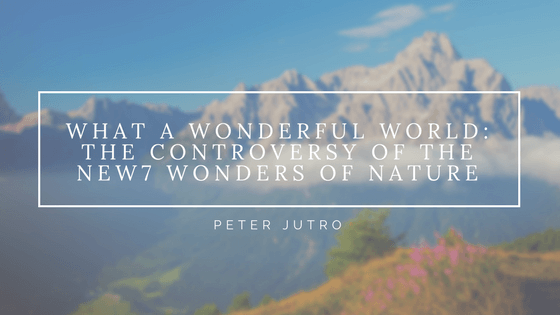
Bernard Weber’s idea was simple in theory: given everyone’s familiarity with the 7 Wonders of the World concept, have an independent organization create a system of worldwide voting to identify the 7 Natural Wonders of the World. In practice, however, it turned out to be a difficult process. While the foundation still exists today, controversy continues to surround the organization.
The History of the New7Wonders of Nature
Bernard Webster launched the New7Wonders Foundation in 2007 by asking people of the world to choose and elect the new human-made seven wonders. The popularity of the campaign grew, attracting millions of voters. In July, 2007, the foundation announced its New 7 Wonders of the World.
The reception of the New 7 Wonders of the World sparked the idea of identifying the 7 Natural Wonders of the World. Over 100 million votes were cast from around the world. After the dust settled, the foundation announced a list of 28 “Official Finalist Candidates.”
They stated that consideration for the New 7 Wonders of Nature followed strict criteria, and that uniqueness of beauty and ecological significance were two of the criteria. The finalists included the Dead Sea, the Grand Canyon as well as others. On November 11, 2011, Bernard Weber announced the New 7 Wonders of Nature.
Controversy Begins
Obviously such selection is difficult to do objectively, and the approach used by the foundation generated questions about the list’s legitimacy. The absence of detailed information on the foundation’s website sparked many questions such as: What is this foundation about and is it credible? The website states that they have a partnership with the United Nations, which led people to believe that the UNESCO World Heritage Site programme supported the effort. UNESCO refuted these claims, stating that they do not approve nor have any association with the competition.
Voting itself raised many red flags about this competition. Among the concerns were that people could vote multiple times, and that local and national governments spent millions of dollars campaigning to get people to vote.
Further, every country that wanted to have a natural wonder entered submitted a $200 entry fee. This fee seemed to many to be a reasonable amount for what could be a great honor. However, the Maldives, which pulled out of the competition, received requests from the New Open World Corporation (NOWC), a corporation associated with the New7Wonders Foundation, for sponsorship fees.
They were informed that a platinum option cost $350,000, and the two gold options were $210,000 each. The foundation also requested that the Maldives provide financing for a World Tour event, allowing a delegation to visit the country.
The total costs for these services would have been over half a million dollars. This was just one example of incidents reported as people examined the voting process.
Bribery Allegations in Indonesia
The NOWC also targeted Indonesia, requesting $10 million in licensing fees from Indonesia’s tourism authorities. They also requested an extra $35 million bill to finance the final announcement event.
The consequences of not abiding by the NOWC were severe. Komodo Island faced suspension from the finalist list should the Tourism Ministry not meet the demands.
The country combatted the financial extortion by threatening to sue Bernard Weber and his organizations. Facing the heat of Indonesia’s counter attack, the NOWC relented, and kept Komodo island on the ballot.
Where do we go from here?
I continue to be fascinated by Weber’s initial idea of trying to construct a genuine discussion regarding the most significant natural places our planet has to offer. In practice, however, it turned into a questionable competition that exploited nationalism.
I would add a personal note: last year I happened to visit Korea’s Jeju Island, and learned of its nomination. This got me interested in the 7 wonders of fort as it puzzled me that a pretty, but hardly spectacular island could prevail over natural wonders such as the Grand Canyon. Of course, the results of such competitions will always be inherently subjective, but it’s my hope that should similar projects be undertaken in the future, they will be characterized by far greater transparency, objectivity, and methodological clarity, and managed responsibly.
